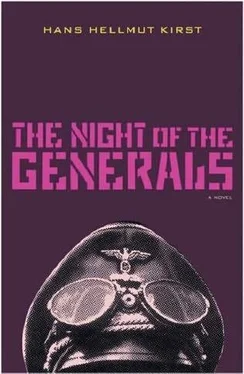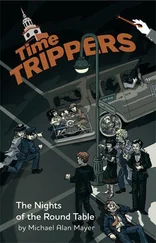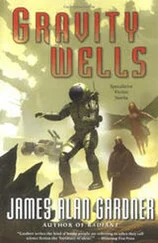Without special preamble, Kahlenberge asked whether General Tanz would be prepared to answer some questions which a certain Major Grau of local Intelligence proposed to ask him. The questions involved might well be of an embarrassing nature, to say the least. Indeed, said Kahlenberge, defamatory or insulting might be a more appropriate description.
“General Tanz,” said Sandauer, wholly unimpressed, “is not in the habit of dodging an issue. However, may I draw your attention to the fact that the General is a man of very strong views and that he never hesitates to express them forcibly?”
“I’m aware of that—in fact I’m counting on it.”
“With respect, General, may I ask what you’re driving at?”
“Certainly,” answered Kahlenberge with equal frankness. “I should esteem it if a certain gentleman could be reminded of the golden rule which states that subordinates may normally ask questions only when expressly requested to do so.”
“That,” said Sandauer, “is a view which General Tanz unquestionably shares. I shall hardly need to remind him of the fact.”
“In that case I shall send our inquisitive friend to see you at a particularly suitable time. What has your General got in mind for this afternoon, my dear Sandauer?”
“A sort of dress rehearsal, sir,” replied Sandauer. “That is to say,” he added prudently, “he plans to try out a new technique on a very limited scale and for a very limited period.”
Kahlenberge concealed his disapprobation and astonishment at Tanz’s high-handed decision. As Chief of Staff, he would normally have intervened at this stage, but he was not a man to make two mistakes in succession. One ill-considered question was enough for the moment, so he contented himself with asking: “Is what you have just told me an official report or merely for my personal information?”
Sandauer was not slow to take Kahlenberge’s point. “I thought we’d just been having an informal little chat, sir.”
“Exactly what I thought too.”
“But to return to your suggestion, I think the most unfavourable time and the most inconvenient place to ask General Tanz questions would be at fifteen hundred hours this afternoon, on the south side of Promenade Square.”
Having concluded his business with Major Sandauer, Kahlenberge made another telephone call, this time to Major Grau of the Abwehr. He informed Grau that the G.O.C. was unfortunately prevented by social obligations from placing himself at Grau’s disposal and would therefore have to forgo that pleasure for the time being. He, Kahlenberge, was also unable to spare the time, and for similar reasons, but Grau would be quite at liberty to see General Tanz at fifteen hundred hours on the south side of Promenade Square.
Major Grau extended his thanks for this information. Kahlenberge was irritated to detect a trace of a smile in Grau’s voice, but he had no time to dwell on such things because the evening’s arrangements once more claimed his full attention.
Wilhelmine von Seydlitz-Gabler was scrutinizing the preparations for her soirée, in particular the activities of Melanie Neumaier.
“You’re doing an invaluable job as usual,” Frau Wilhelmine told her. “My husband and I appreciate it so much. I know the General’s extremely fond of you. No, don’t blush, my dear girl, I’m sure you’re fond of him too.”
“I admire the General immensely,” breathed Melanie. “He’s a great man.”
“But a very human one.” Frau Wilhelmine conducted this exchange as though she were discussing clothes, the weather or National Socialism, running her eagle eye over the list of invitations meanwhile. Not a name escaped her, and she discovered three or four important omissions which Melanie Neumaier dutifully added to her list. Frau Wilhelmine nodded approvingly.
“My husband, dear Fräulein Neumaier, has led an arduous life in the service of his country. He isn’t the strongest of men, you know, and it has taken its toll of his health. Unfortunately, I can’t always be with him. This posting in Warsaw is a fortunate exception to the normal rule. If he ever falls ill, can I rely on you to look after him?”
“I should be honoured, madam!” said Melanie fervently, welling over with gratitude. She felt like the recipient of a sacred trust. “You can rely on me. I’ll do everything within my power.”
Frau Wilhelmine was entirely satisfied with this reaction. She thought she knew her husband far too well to be uneasy about the passionate devotion of a doubtless highly inhibited girl. In fact she had no scruples about amusing herself—in a well-bred way, of course—at Melanie’s expense.
In high good humour, Frau Wilhelmine decided to seek out the second of Kahlenberge’s organizers, Captain Kraussnick, the recreation officer. Kraussnick hailed from the restaurant business (dancing and entertainment section) and was destined to return to it after the war.
Kraussnick was quite equal to introducing a little culture into his programmes of entertainment when so desired. On this occasion he had paid a visit to the Warsaw Conservatoire, lined up the entire establishment, staff included, and issued the simple order: “Pianists stand fast! The remainder, dismiss!” He was left with a round dozen individuals of either sex, none of whom disclaimed a special ability to play Chopin, especially as it had been announced that the fee was to be a parcel of “fodder.” Looking them over with the eye of a connoisseur—though not of music—Kraussnick had settled for a firm-fleshed, lusty-looking brunette named Wanda.
Wanda now stood before him with Lance-Corporal Hartmann at her side. Hartmann had been assigned to Kraussnick by General Kahlenberge, who had hinted in confidence that the young man was something of an art historian and had pretensions to culture. Accordingly, Kraussnick had detailed Hartmann to discuss Wanda’s recital programme with her.
At this moment Frau Wilhelmine entered the room. Kraussnick hurried over to her, came to attention and delivered a semi-military report. He bent over her graciously extended hand and kissed it with near reverence. Then he drew the attention of the “verehrte gnädige Frau"to sundry details of organization, pointing to the numerous baskets full of bottles, the battery of glasses, the piano, Wanda, and Hartmann.
Frau Wilhelmine assumed an air of unwonted interest and approval. She even nodded benevolently, though with a touch of condescension, at Wanda. Then, looking down from the invisible platform on which she always stood, she directed an inquiring gaze at Hartmann.
“Are you new here?”
Hartmann did not reply “Yes ma’am.” He merely bowed, but with a grace and deference which made an immediate impact on Frau Wilhelmine. The young man not only made a pleasant impression. He obviously had manners too.
“You mustn’t let me detain you, my dear Captain Kraussnick. Please finish what you were discussing.”
“Certainly ma’am!” The recreation officer obediently turned to Wanda and Hartmann. “Well, ladies and gentlemen,” he said briskly, “what are we going to give them afterwards? Frau von Seydlitz-Gabler wants Chopin and her wish is our command—but which pieces by Chopin?”
“The Polonaises,” suggested Wanda.
“Sounds a good idea,” said Kraussnick approvingly. “Polonaise—that’s a sort of dance, isn’t it? Plenty of go. No one’ll doze off, and that’s an important consideration.”
Frau Wilhelmine looked at Hartmann. “What do you think? Do you agree with the suggestion?”
“Chopin’s Polonaises are superb,” Hartmann observed politely, “but not perhaps what might be termed appropriate under present circumstances. The Polonaises are patriotic compositions. In fact Robert Schumann once described them as cannon garlanded with flowers.”
Читать дальше












